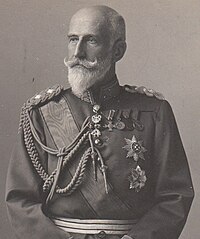Duke Philipp of Württemberg
| Philipp | |||||
|---|---|---|---|---|---|
| Duke of Württemberg | |||||
 |
|||||
| Born |
30 July 1838 Neuilly-sur-Seine, Kingdom of the French |
||||
| Died | 11 October 1917 (aged 79) Stuttgart, Kingdom of Württemberg |
||||
| Spouse | Archduchess Marie-Thérèse of Teschen | ||||
| Issue |
Albrecht, Duke of Württemberg Duchess Marie Amélie of Württemberg Duchess Maria Isabella of Württemberg Duke Robert of Württemberg Duke Ulrich of Württemberg |
||||
|
|||||
| House | House of Württemberg | ||||
| Father | Duke Alexander of Württemberg | ||||
| Mother | Princess Marie d'Orléans | ||||
| Religion | Roman Catholicism | ||||
| Full name | |
|---|---|
| Philipp Alexander Maria Ernst |
Duke Philipp of Württemberg (July 30, 1838 – October 11, 1917) was a German prince, head of the Roman Catholic cadet branch of the dynasty which ruled the Kingdom of Württemberg. He was the son of Duke Alexander and of Princess Marie d'Orléans, a daughter of Louis Philippe, King of the French.
Upon the death of his cousin Duke Nicholas of Württemberg in 1903, he became heir presumptive to the royal throne of Württemberg until his death in 1917. On 29 November 1918 Württemberg's monarchy was abolished in the collapse of the German Empire following World War I, while his kinsman of the senior branch of the dynasty, Wilhelm II, was still king (and lived, after his abdication, until 2 October 1921).
In 1865 Philip of Württemberg married Archduchess Marie-Thérèse of Teschen (1845–1927) (daughter of Archduke Albert, Duke of Teschen and Princess Hildegard of Bavaria). They had five children:
Philip of Württemberg belonged to the fifth branch (called the "Ducal branch") of the House of Württemberg, descended from the seventh son of Frederick II Eugene, Duke of Württemberg. On the extinction of the eldest branch in 1921, the Catholic ducal line remained the only dynastic branch of the formerly reigning family. The House of Württemberg's two morganatic branches - that of the Dukes of Teck (extinct in the male line in 1981), and of the Dukes of Urach - were genealogically senior to the Ducal branch, but had been ineligible to succeed to the throne.
...
Wikipedia
